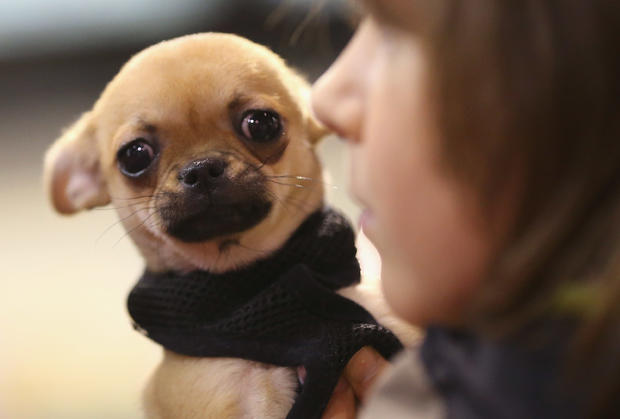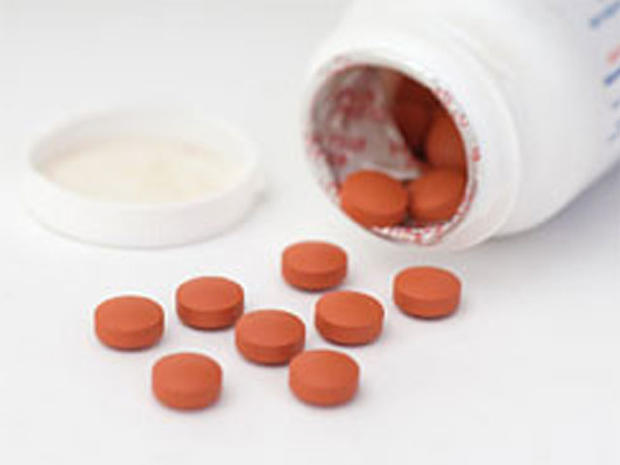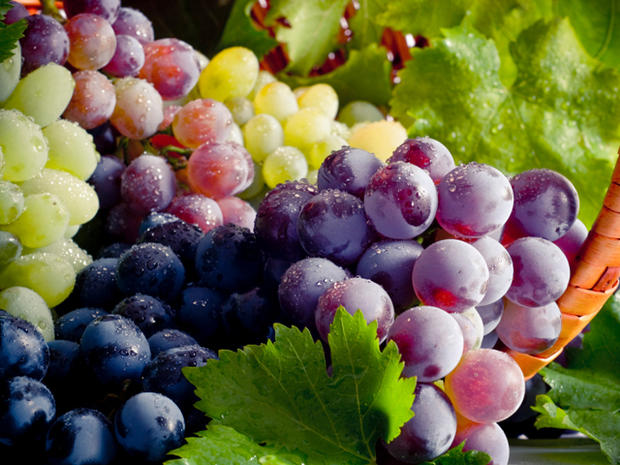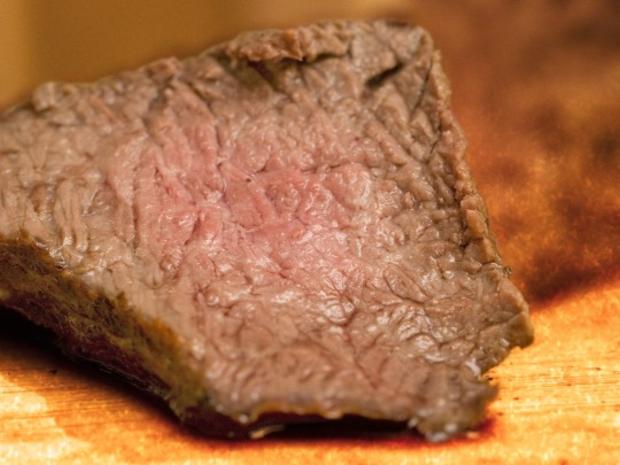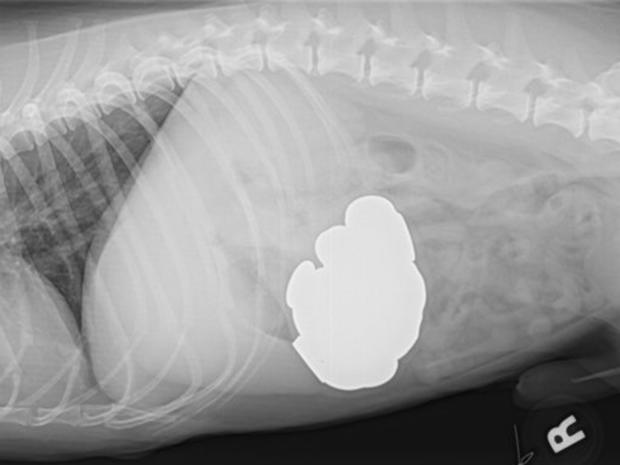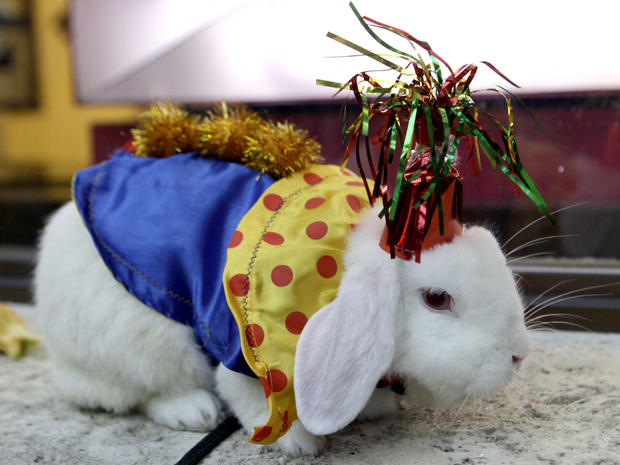Common household items that can lead to a costly trip to the veterinarian
Pet owners know nothing turns around a long day faster than the unbridled joy exhibited by your cat or dog the second you open that front door.
If you come home to find your labradoodle went to town on that chocolate bar you left out the previous night, that's another story.
Petplan pet insurance receives countless claims of animals eating something they shouldn't have and requiring an emergency trip to the veterinarian to get stomach flushes or worse, surgery.
Dr. Jules Benson, vice president of Veterinary Services at Petplan, recounted several cases in an interview with CBSNews.com, with tales ranging from pets needing emergency care from eating seemingly-harmless flowers to a beagle who ate drywall and needed surgery -- only for vets to find a sock was also in there.
Benson urges anyone who finds their pet has eaten something potentially dangerous on this list to call their veterinarian or the ASPCA Animal Poison Control Center at 1-888-426-5535. Make sure you know what food or substance they ate, how much of it, and when they took it, along with other information about your pet such as weight and age. All these factors could save your precious pal's life.
What better time to raise awareness for this issue than National Poison Prevention Week 2013, March 17 to 23? With Benson's assistance, we've compiled a list of common household items that pet owners should be wary of.
Medication
The same is true for pets.
"Pets don't actually have the enzymes to metabolize like humans do," noted Benson, which may make certain pills even more dangerous to pets. Ingestion can lead to kidney and liver failure rather quickly if they get their paws on these pills. If you drop an antidepressant and your dog sweeps it up it may not be a huge deal, said Benson, but medications for ADHD like Aderrall (amphetamine) can be another story entirely because of their extreme toxicity to animals. Once Benson saw a dog that needed nearly $6,000 in veterinary care because it ate its owner's warfarin, a common medication prescribed to reduce stroke risk.
Over-the-counter meds can be just as problematic. Dogs love sweet foods and that applies to tablets like ibuprofen or acetaminophen, which contain added sugar to mask the taste. According to 2012 Petplan claims data, ibuprofen and acetaminophen toxicities carry the highest average costs for treatment of all poisoning claims ($840 and $700 per incident, respectively).
Benson said he's heard of cases of dogs chewing through bottles of ibuprofen or busting through child safety-locked cabinets, so to be safe, keep the pills completely out of reach of pets.
Plants
Cats especially tend to play with houseplants or nibble on leaves and flowers. Benson warns that lilies, in particular, are "extremely toxic" to cats, with one 2012 claim reaching $1,800. The Food and Drug Administration says all parts of lilies (leaf, pollen and flower) are toxic for cats and can cause vomiting, lethargy, loss of appetite, kidney failure may lead to death. Lilies are especially popular around Easter, so this is a timely tip.
Dogs also eat plants, but Benson notes they are more likely to dig and go straight for the bulbs, which are actually more concentrated in toxins. He noted one recent claim from a goldendoodle who snacked on narcissus bulbs and needed emergency care.
Other plants with toxins include tomato plants, tulip bulbs, azalea, rhododendron, and wild mushrooms. Some fertilizers or mulch people use in the yard also contain toxins and can cause harm if eaten.
Just like for medication and foods, people can contact their vet or a pet poison control center if they're ever in doubt about a plant or flower their pet ate.
Household chemicals
Numerous claims were submitted from pets eating common chemicals kept around the house, especially ones that dogs perceive as tasting great.
Dogs love the taste of antifreeze, but even just a small amount can cause kidney failure and death in pets. Benson cited a story of a pair of puppies who got into antifreeze and wound up costing their owners nearly $6,000 combined.
"Antifreeze is tough because ethylene glycol is sweet," noted Benson. "It acts quickly and can be difficult to get out of system."
If you spot a spill, mop it up thoroughly and keep pets clear, he recommends.
Pesticides can also be a problem, causing internal bleeding in pets if ingested. If your pets are natural hunters, you may want to consider using traps instead of poisons.
Certain foods
"People don't realize grapes and raisins can be very toxic to cats and dogs," Benson added.
Some food may be accidentally dropped when cooking, or some pet owners may be clueless their animals can't eat these foods, and offer grapes as a "healthy" treat.
While sweets like chocolate are especially toxic for pets, so too are sugar-free candies, Benson cautioned. A common situation where a pet digs through a purse and gets a hold of sugar-free gum or diabetic sweets that can lead to problems ranging from gastrointestinal upset to life-threatening illness, because the animals can't metabolize the sweeteners.
Benson recommends people become more aware of these foods pets can't handle and keep an eye on the animal when in the kitchen. Put these forbidden foods away and out of sight, making it a priority after a trip to the grocery store.
Fatty meats
"It can be incredibly painful and fatal" in pets, said Benson.
People with pets may want to just keep the table scraps to themselves or give them veterinarian-approved treats instead.
Another disease caused by commonly-consumed meats is salmon poisoning in dogs. If dogs eat certain types of raw fish like salmon, they can contract a parasite that leads to symptoms including vomiting, fever, diarrhea, weakness and dehydration, according to the Washington State University College of Veterinary Medicine. Dogs are the only species susceptible to this disease, and left untreated, can cause death within two weeks of eating the infected fish.
Illegal drugs
Over-the-counter and prescription pills aren't the only drug concerns for pets. Benson has seen several reports of dogs eating marijuana or medications that people may be taking illegally, without a prescription. That's a problem, he said, because owners tend to not be forthcoming about what their dog ate if the activity is illegal. If they want their pet to live and get the proper care from the vet, it's essential to come clean, he warned.
"Even if it's illegal, tell the vet," Benson urged.
Pretty much anything else...
One pet he saw had a kebab skewer embedded in it for six weeks before the stick made its way through the lung and out the side of the body. Luckily the dog had been on antibiotics throughout.
Recently, a Jack Russell terrier from New York City had 111 pennies removed in an emergency procedure. Zinc on the coins can be toxic for both dogs and cats, according to Benson.
"Basically, keep everything away from your pet," he joked.
But in all seriousness, Benson urged pet owners to just become more aware. If they are more aware of the risks, they can keep specific items of concern out-of-reach and locked away, or can calmly call a vet in case of an emergency.
As for other pets?
Benson notes there's major risk for other types of rodents and reptiles. For example, people with pet rats should stick to commercially-formulated foods, because certain raw or unripe produce like beans, peanuts, potatoes or green bananas can't be metabolized by them.
Got a pet bunny? Not all greens are good for them, including rhubarb leaves, most evergreens and bracken. Rabbits also love to chew, so watch them closely if you let them out of their habitats.
"Be sure they don't decide to snack on dangerous delights, ranging from electrical wires, carpets or rugs -- which could lead to gastrointestinal obstructions -- or stained or painted wood, such as baseboards or furniture, which could lead to chemical or lead poisoning," he said.
Birds also have special considerations based on their breed and often different diary requirements, so check with your vet to see what he or she recommends. Parakeets, for example, are sensitive to scented cleaners, aerosol sprays or non-stick cookware which can give off fumes toxic to birds.
The ASPCA has more information on poisoning in pets.
